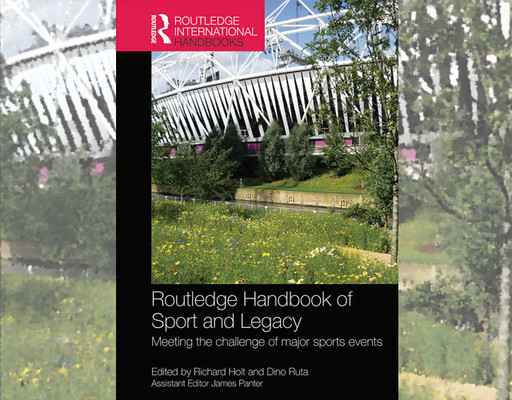
The CIES is delighted to announce that the Routledge International Handbook of Sport and Legacy has been published. This major work, which contains twenty five carefully commissioned international chapters, is the culmination of joint research between SDA Bocconi School of Management in Italy and the International Centre for Sports History and Culture at De Montfort University, UK. Since its inception, the project has been supported by the Centre International d’Etude du Sport (CIES) in Switzerland.
Editors Prof. Richard Holt (DMU), Prof. Dino Ruta (SDA Bocconi) and Assistant Editor James Panter (DMU) put the final touches to the publication in January 2015.
The new book addresses perhaps the most important issue in the hosting of major contemporary sporting events: the problem of ‘legacy’. It offers a rigorous, innovative and comparative insight into this contested concept from both a management and historical case study perspective with contributions from world-leading scholars and practitioners. Detailed case studies of major sporting events such as the Giro d’Italia, FIFA World Cup and ten Olympic Games from London 1908 to London 2012 are all featured.
Major events must now have a conscious, credible and defined policy for legacy to meet public expectations. The book takes a broad pluralistic approach, moving from the planning and governance of legacy, to urbanisation, socio-cultural aspects, human capital and politics. Hence, the Routledge International Handbook of Sport and Legacy provides a comprehensive survey of the various kinds of legacy that can be delivered, as well as a close examination of the potential benefits, practical challenges and the importance of leadership. From ‘hard’ legacies, such as stadia and infrastructure, to ‘soft’ legacies including skill development, attitude change and capacity building, the book offers both historical case studies and an innovative strategic management approach, and establishes what can realistically be achieved in terms of economic, cultural, physical and sporting development.
The publication will be invaluable reading for students and researchers working in sports studies, event management, event bidding, human geography, economics or planning, and an essential reference for any professional engaged in delivering legacy through sport.
This website uses cookies – limited to technical and analytical cookies – in order to allow your browsing and enhance your experience.
For more information, please see our cookie policy and our privacy notice.